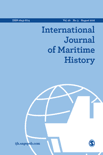
International Journal of Maritime History
Scope & Guideline
Diving Deep into the Sea of Historical Inquiry
Introduction
Aims and Scopes
- Interdisciplinary Approaches to Maritime History:
The journal employs diverse methodologies, integrating insights from history, sociology, anthropology, and cultural studies to analyze maritime phenomena. - Focus on Global Maritime Networks:
Research often centers around the interconnectedness of maritime routes and their significance in shaping economic, political, and cultural exchanges across regions. - Exploration of Social and Cultural Aspects:
The journal emphasizes the social histories of maritime communities, including the experiences of sailors, traders, and local populations affected by maritime activities. - Attention to Underrepresented Narratives:
A commitment to highlighting marginalized voices and experiences, including those of women, enslaved peoples, and indigenous communities within maritime contexts. - Historical and Contemporary Relevance:
The journal not only delves into historical maritime issues but also discusses their implications in contemporary maritime policies, trade, and environmental challenges.
Trending and Emerging
- Gender and Maritime Identity:
Increasing attention is being paid to gender roles within maritime contexts, exploring how women's experiences and contributions shape maritime narratives. - Maritime Environmental History:
There is a rising focus on the environmental impacts of maritime activities, including discussions on sustainability, ecological changes, and the human-nature relationship in maritime settings. - Globalization and Maritime Trade Dynamics:
Research is increasingly examining the implications of globalization on maritime trade, including the historical evolution of global supply chains and their socio-economic impacts. - Cultural Interactions and Exchanges:
Emerging studies are highlighting the cultural exchanges facilitated by maritime activities, including the transmission of ideas, practices, and technologies across different regions. - Indigenous and Local Perspectives:
There is a growing interest in incorporating indigenous and local narratives in maritime history, emphasizing the roles of local communities in global maritime networks.
Declining or Waning
- Traditional Naval Warfare Studies:
There has been a noticeable decrease in publications focusing solely on traditional naval battles and military strategies, as the field increasingly embraces broader social and cultural dimensions of maritime history. - Eurocentric Perspectives:
Research that centers exclusively on European maritime activities is waning, giving way to more inclusive studies that consider global perspectives and interconnections. - Static Economic Analyses:
Analyses that treat maritime trade as a static phenomenon without considering dynamic changes, such as shifts in geopolitical contexts or technological advancements, are becoming less frequent.
Similar Journals

Naval War College Review
Advancing Maritime Strategy Through Rigorous AnalysisNaval War College Review is a prestigious academic journal published by the US Naval War College, dedicated to advancing scholarship in naval and maritime strategy, military operations, and international relations. This journal serves as a vital platform for the dissemination of cutting-edge research, insightful analysis, and theoretical discourse that addresses contemporary and historical issues affecting global security and naval warfare. With an ISSN of 0028-1484, the review offers an important repository of knowledge for researchers, professionals, and students alike, encompassing interdisciplinary studies related to naval strategy, policy formulation, and military history. The Naval War College Review is committed to fostering a deeper understanding of the maritime domain, empowering its readers to navigate the complexities of naval warfare through rigorous scholarship. Although it is not an open-access journal, its critical contributions continue to shape the future of naval studies and defense considerations across the globe.
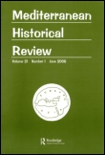
Mediterranean Historical Review
Advancing Scholarship in Mediterranean Cultural DynamicsThe Mediterranean Historical Review, published by ROUTLEDGE JOURNALS, TAYLOR & FRANCIS LTD, is an esteemed academic journal that has been a cornerstone of scholarship in the field of historical studies since its inception in 1986. With a rich focus on the cultural, social, and political dynamics within the Mediterranean region, this journal serves as a vital resource for researchers, professionals, and students alike, fostering a deeper understanding of the intricate historical narratives that shape contemporary society. Although it does not offer open access, the Mediterranean Historical Review boasts a commendable impact factor and ranks within the top quartiles of cultural studies and history, underscoring its significance in the academic community. With Scopus rankings placing it in the 76th percentile in Arts and Humanities (History) and notable positions in Cultural Studies and Sociology, the journal invites contribution from a diverse array of scholars dedicated to exploring the multifaceted past of the Mediterranean region. For those passionate about history, this journal is an indispensable platform for the dissemination of cutting-edge research and scholarly dialogue.

Maritime Transport Research
Navigating the Future of Maritime InnovationMaritime Transport Research is a cutting-edge journal dedicated to advancing knowledge and innovation within the field of maritime transport. Published by ELSEVIER, this Open Access journal has been active since 2020, providing researchers, professionals, and students with free and unrestricted access to high-quality research content. With an impressive impact factor and categorized in the Q2 quartile for the field of Transportation, this journal ranks #50 out of 141 in Scopus' Social Sciences _ Transportation category, placing it in the 64th percentile among its peers. Maritime Transport Research aims to foster interdisciplinary dialogue and promote scholarly advancements by publishing original research, reviews, and case studies that address the complexities and dynamics of maritime logistics, policy, and technology. Located in the United Kingdom, this journal is a vital resource for anyone engaged in maritime studies, highlighting its commitment to supporting the academic community through rigorous and impactful research.
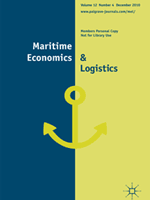
Maritime Economics & Logistics
Shaping the Future of Transportation Economics.Maritime Economics & Logistics, published by Palgrave Macmillan Ltd, is a premier journal in the field of maritime studies, focusing on the intersection of economics, logistics, and transportation. With an impressive impact factor and positioned within the Q1 quartile for *Economics, Econometrics and Finance (miscellaneous)* and Q2 in *Transportation*, this journal is recognized as a beacon of scholarly excellence. Spanning from its inception in 1999 to present, it aims to provide insightful analyses and innovative solutions to the challenges faced by the maritime industry, making it an essential resource for researchers, professionals, and students. With Scopus rankings that place it among the top-tier journals in both *Economics* and *Social Sciences*, it fosters a collaborative environment for the dissemination of cutting-edge research and practical developments in maritime economics and logistics. Join a vibrant community of scholars and enhance your understanding of this critical field.
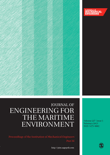
Proceedings of the Institution of Mechanical Engineers Part M-Journal of Engineering for the Maritime Environment
Advancing Knowledge at the Intersection of Technology and the SeaProceedings of the Institution of Mechanical Engineers Part M - Journal of Engineering for the Maritime Environment, published by SAGE Publications Ltd, is a leading scholarly journal that addresses critical advancements in the field of maritime engineering. With an ISSN of 1475-0902 and an E-ISSN of 2041-3084, this journal serves as an essential platform for researchers and practitioners alike, disseminating original research, reviews, and case studies relevant to mechanical and ocean engineering. Recognized for its rigorous peer-review process, it currently holds a commendable Q2 ranking in both Mechanical Engineering and Ocean Engineering. The journal's reputation is bolstered by its strategic emphasis on innovative practices and sustainability in maritime environments. By providing a valuable resource for interdisciplinary collaboration, the journal facilitates the intersection of technology and engineering solutions critical for the evolving challenges within the maritime sector. Researchers, professionals, and students alike will find this journal instrumental in keeping abreast of the latest developments, best practices, and future directions in maritime engineering.
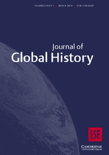
Journal of Global History
Advancing Understanding Through Historical Perspectives.Journal of Global History, published by Cambridge University Press, is a leading interdisciplinary journal that explores the intricate networks of people, cultures, and economies over time, making it an essential resource for scholars in the fields of history, sociology, and political science. With an impressive impact factor reflected in its Q1 rankings in both History and Sociology & Political Science categories for 2023, the journal ranks among the top periodicals in these disciplines (Rank #26/1760 in History and Rank #348/1466 in Sociology). Since its inception in 2006, the Journal has committed itself to publishing high-quality research that pushes the boundaries of global historical studies, connecting past events to contemporary issues. Although the journal currently does not offer open access options, its valuable insights contribute to academic discourse and promote a deeper understanding of global processes that shape our world today. This journal is a must-read for researchers, professionals, and students who are keen on understanding the evolution of global interactions through diverse historical lenses.

Transactions on Maritime Science-ToMS
Bridging Disciplines to Tackle Maritime ChallengesTransactions on Maritime Science-ToMS is a distinguished journal published by the FAC MARITIME STUDIES in Croatia, dedicated to the exploration and dissemination of cutting-edge research across multiple disciplines within maritime studies, including Automotive Engineering, Law, Ocean Engineering, Transportation, and Water Science and Technology. Since its inception, this journal has made significant strides in impacting these fields, as evidenced by its recent Scopus ranks and impressive quartile classifications, with recognitions in Q2 and Q3 across various categories. The journal operates on an open-access model, enhancing the visibility and accessibility of important research findings to professionals, researchers, and students alike. In an era where maritime challenges are at the forefront of global discourse, ToMS aims to foster interdisciplinary communication and innovation to address pressing issues in maritime science and engineering. As such, it serves as a vital resource for advancing knowledge and promoting best practices within both academic and applied contexts.

Archaeologia Maritima Mediterranea-An International Journal on Underwater Archaeology
Navigating the Riches of Submerged CulturesArchaeologia Maritima Mediterranea is a prestigious international journal focused on the vital field of underwater archaeology, published by FABRIZIO SERRA EDITORE. With an ISSN of 1724-6091 and E-ISSN 1825-3881, this journal has been a cornerstone for scholars and enthusiasts alike in the study of maritime cultures, shipwrecks, and submerged sites around the Mediterranean region since its inception. Operating from its base in Pisa, Italy, the journal has a commendable academic presence, reflected in its recent Scopus rankings which place it in the lower quartiles in both Arts and Humanities, and Social Sciences subcategories within archaeology. Despite its current Q4 categorization, it serves as an important platform for emerging research and advancements in the field, aiming to foster collaboration and knowledge exchange amongst researchers, practitioners, and students. While the journal is accessible through traditional subscription models, the lack of open access emphasizes the publisher's commitment to maintaining high academic standards. The collection of issues from 2011 to 2023 showcases a rich tapestry of research that contributes significantly to our understanding of underwater cultural heritage.

ACADIENSIS
Advancing Scholarship in Regional Narratives.ACADIENSIS, a prominent academic journal published by the University of New Brunswick, serves as a vital resource in the field of history, particularly focusing on the unique narratives and historiographical developments within the Atlantic Canadian context. With an ISSN of 0044-5851 and an E-ISSN of 1712-7432, this journal offers a platform for both emerging and established scholars to disseminate their research, contributing to the rich tapestry of historical scholarship. Despite its Q3 ranking in the history category as of 2023 and a Scopus rank of 969 out of 1760, the journal's emphasis on regional history allows for a profound exploration of local narratives, enhancing the broader understanding of Canadian heritage. Situated at the Department of History in Fredericton, New Brunswick, Canada, ACADIENSIS encourages interdisciplinary dialogue and offers a range of insights into themes of identity, culture, and social change, making it an indispensable resource for researchers, professionals, and students alike seeking to deepen their understanding of historical perspectives.

Journal of Maritime Archaeology
Navigating the Intersection of Culture and OceanThe Journal of Maritime Archaeology, published by Springer, is a premier scholarly platform dedicated to advancing the understanding of maritime cultural heritage and underwater archaeology. With an ISSN of 1557-2285, this journal has continuously contributed to the field since its inception in 2006 and is set to celebrate its evolution until 2024. Holding a distinguished position as a Q1 journal in the field of Archaeology (Arts and Humanities) as of 2023, it ranks impressively at #96 out of 413 journals in its category, placing it in the 76th percentile of its field. This journal aims to disseminate high-quality research that explores the interplay between maritime environments and human activities, showcasing innovative methodologies, historical narratives, and cultural analyses. Researchers, professionals, and students engaged in maritime studies will find this journal an invaluable resource for advancing knowledge and fostering international collaboration in this vital area of archaeology.